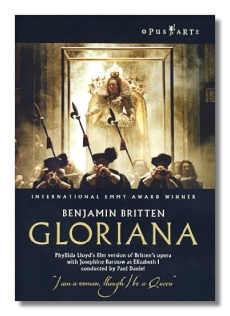
The Internet's Premier Classical Music Source
Related Links
- Britten Reviews
- Latest Reviews
- More Reviews
-
By Composer
-
Collections
DVD & Blu-ray
Books
Concert Reviews
Articles/Interviews
Software
Audio
Search Amazon
Recommended Links
Site News
 DVD Review
DVD Review
Benjamin Britten

Gloriana, Op. 53
- Dame Josephine Barstow – Queen Elizabeth I
- Tom Randle – Robert Devereux, Earl of Essex
- Emer McGilloway – Frances, Countess of Essex
- David Ellis – Charles Blount, Lord Mountjoy
- Susannah Glanville – Penelope, Sister of Devereux
- Eric Roberts – Sir Robert Cecil
- Clive Bayley – Sir Walter Raleigh
- Richard Whitehouse – Henry Cuffe
Chorus of Opera North
English Northern Philharmonia/Paul Daniel
Production Director – Phyllida Lloyd
Opus Arte OA0955D DVD 138min LPCM Stereo DTS Anamorphic Widescreen
At first I was annoyed: imagine cutting almost one-third of one of Britten's most elusive operas! Hasn't it had enough abuse already? To make matters worse, I then read that the "concept" behind this shortened film production was to take the camera backstage at different points in the action, and to show Josephine Barstow late for her makeup call, changing in and out of her costumes, and so on, all to draw parallels between the isolation of Queen Elizabeth I and the opera's star performer. "Oy vey," I thought to myself. Little did I know that once I pushed "Play," I would be mesmerized, and that 100 minutes later, as the final credits rolled and a few errant tears ran down my cheeks, I would be utterly convinced by what I had seen.
Gloriana was Britten's coronation opera for Queen Elizabeth II in 1953. To make a long story short, the opera was not a success, although the reasons why are complicated, and have little or nothing to do with Britten's music or William Plomer's libretto. The opera did not even receive a commercial recording until 1992, when conductor Sir Charles Mackerras recorded it for Argo (440 213-2), with Barstow in the title role. (Unfortunately, that recording has gone out of print.) In 1993, Opera North presented the opera, again with Barstow, and it was revived by them twice, most recently in 1999. At that time, the BBC commissioned a film of the opera to be directed by Phyllida Lloyd, and that is what is presented on this DVD, along with 38 minutes of bonus material featuring, for the most part, interviews with Lloyd, Barstow, Tom Randle (Essex), conductor Paul Daniel, and others.
The cuts are drastic; some roles entirely disappear. By speeding the action along so quickly, Lloyd risks making Elizabeth I seem merely petulant or rash. Nevertheless, Barstow's characterization is so subtle and detailed that these dangers are largely avoided, and what Gloriana has lost has been compensated for in dramatic intensity. Lloyd has filmed it like a movie, not like a stage production, so the camera mercilessly intrudes everywhere, throwing the viewer right into the thick of things. Not since Dacapo's DVD of Rued Langgaard's opera Antikrist has there been such immediacy. The singing is "live," although the orchestra is pre-recorded.
For the most part, the Argo recording is better sung, but Tom Randle's headstrong Essex is superb, and it is unlikely that Barstow's Elizabeth I ever will be surpassed. Their scenes together are electric. One of the most indelible images in my history of watching opera on DVD will be the one of Randle's Essex, lately returned from Ireland, bursting in on Barstow's Queen – a very unlovely figure early in the morning! – and seeing love, anger, relief, joy, and disappointment all register on her face. That's not something that one will see even in a live production, no matter where one is seated in the house.
So I take it back: Phyllida Lloyd has not ruined Gloriana after all. Instead, she has given her a new lease on life. Long live the Queen, and long live Josephine Barstow. For her, I will treasure this performance for a very long time.
The sound formats are LPCM stereo and DTS surround, and the image is Anamorphic Widescreen. Both are state of the art.
Copyright © 2007, Raymond Tuttle




















